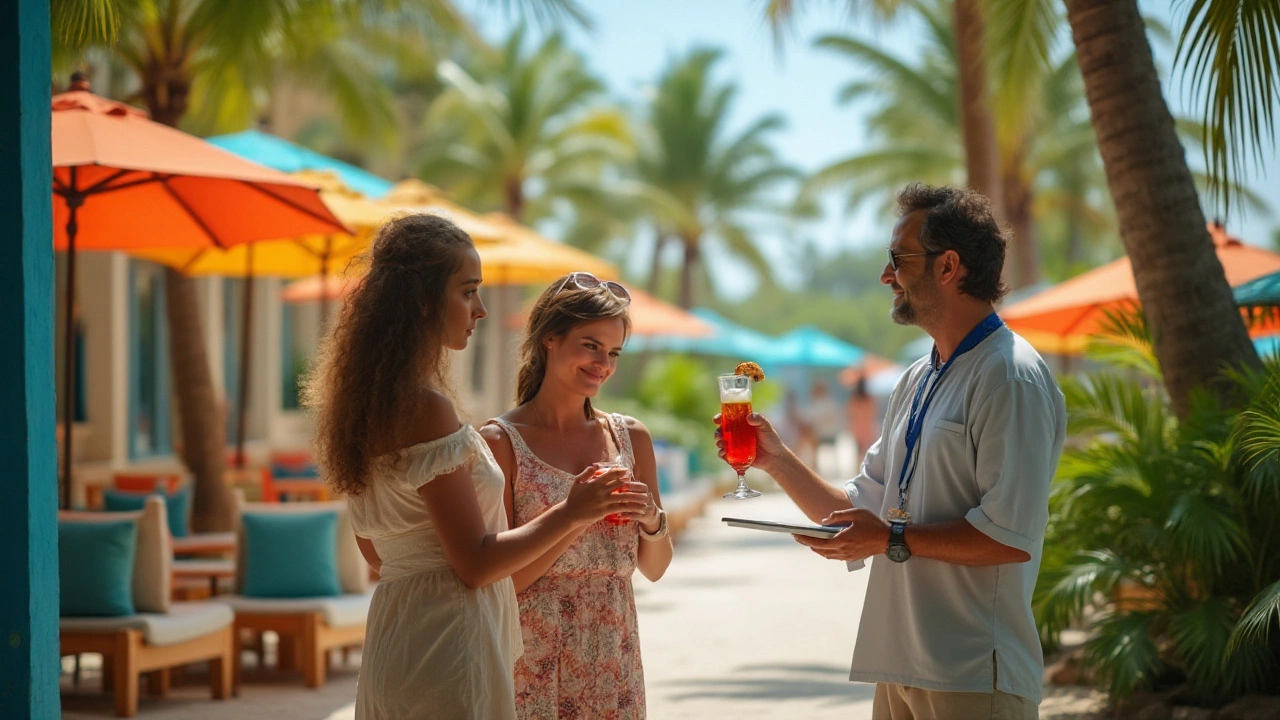Imagine arriving at a stunning beachfront resort, where the soothing rhythms of waves beckon you to relax and let go. You're living in a world where every meal, drink, and activity is already paid for. Yet, in this luxurious, all-inclusive paradise, the question of tipping lingers in the minds of many guests.
Should you carry cash for gratuities, or does all-inclusive truly mean no tipping is required? Let's explore the intricacies of this common travel conundrum and shed some light on tipping etiquette at all-inclusive resorts. Armed with knowledge and insight, you can navigate this tipping dilemma with confidence and grace, ensuring your dream vacation is as smooth as the sea breeze.
- Defining All-Inclusive
- The Tipping Dilemma
- Resort Policies on Tipping
- Cultural Etiquette in Different Locations
- Practical Tips for Tipping
- Maximizing Your All-Inclusive Experience
Defining All-Inclusive
What precisely does the term 'all-inclusive' mean when we book a vacation at a resort? It goes beyond just bundling meals and drinks. The all-inclusive concept, initially popularized by Club Med in the 1950s, has evolved considerably over the decades. Today, it typically covers not only your room, unlimited food, and beverages but also entertainment, activities, and sometimes even excursions. Yet, while the idea sounds straightforward, there's plenty more to it. Depending on the location, 'all-inclusive' could also include transfers to and from the airport or access to premium amenities like spas and golf courses. The specifics can vary widely between resorts and even among packages offered at the same resort, which makes understanding what's truly included crucial for travelers.
Despite the allure of an all-in-one price, travelers should always take a closer look at the fine print. Most resorts clearly outline what is included, but some items, such as premium alcohol brands, certain excursions, or specialized dining experiences, might incur additional charges. It’s important to ask for specifics in writing prior to your arrival to avoid any unanticipated charges. A seasoned travel expert once mentioned,
"The devil is in the details with all-inclusive resorts—always check to confirm exactly what you're getting."Knowing what your package includes allows you to make an informed decision and avoid unwanted surprises.
The concept of all-inclusive alleviates stress and allows guests to immerse fully in relaxation, without the constant concern of accumulating expenses. It offers peace of mind to families, couples, and solo adventurers alike. This makes it a popular choice especially for families looking to balance value and convenience during a vacation. For example, a family with young children might find value in the access to kids’ clubs and activities, keeping the little ones entertained while parents unwind. The question remains, however, about how 'all-inclusive' resorts handle the tipping aspect. Knowing the basic definition is the first step towards understanding the tipping expectations during your stay.
The Tipping Dilemma
Ah, the all-inclusive experience—a blissful escape where every indulgence feels like it's simply part of the package. Yet, as with any aspect of human interaction, the question of tipping hovers uncertainly over these luxurious getaways. The very nature of an all-inclusive resort suggests that everything is covered, but does this concept extend to tipping? For many travelers, the answer isn't as clear-cut as they might hope.
The core of the tipping dilemma often lies in the disparity between guests' expectations and resort policies. While some resorts explicitly state that gratuities are included, others, more subtly, imply that a little extra can go a long way. It leaves guests wondering if omitting a tip might tarnish the service or their experience. The ambiguity of such policies can lead to unnecessary stress, casting a shadow on what should be carefree bliss. Amid all these uncertainties, understanding the cultural nuances and local tipping customs of the destination becomes crucial.
A 2019 study revealed that travelers often anticipate tipping hotel staff at all-inclusives, even when policies suggest otherwise. This behavior sometimes stems from a desire to connect with and reward the hardworking staff who make vacations unforgettable. Yet, cultural attitudes toward tipping can vary significantly. For instance, in places like Mexico and the Caribbean, tipping is not only appreciated but expected. Contrast this with certain European destinations, where tipping may be seen as unnecessary or even offensive.
To navigate the murky waters of the tipping dilemma, travelers should first research specific resort policies and understand local customs. Knowledge is power, and being prepared can alleviate the tipping anxiety many feel. A prior awareness can ensure that rather than feeling pressured, guests tip with intention, enhancing their vacation experience. As etiquette expert Diane Gottsman once noted,
"Tipping is both an art and a science; understanding its nuances reflects our respect for convenience and care."
So, how do travelers decide when and how much to tip? It boils down to a combination of policy awareness, personal comfort, and cultural respect. Guests should consider whether they feel like they receive exceptional care or an extra mile of effort. If they do, a small token of appreciation—perhaps a few dollars left on the nightstand—expresses gratitude without overstepping the respective resort expectations or customs. In all scenarios, the gift of sincerity and kind acknowledgment can carry meaning beyond a monetary gesture, enriching the mutual experience between guest and staff.

Resort Policies on Tipping
Entering the world of all-inclusive resorts can feel a bit like stepping into a realm of mystery, especially when it comes to the finer details like tipping. Some guests relish in the comfort of leaving their wallets in the safe, knowing everything has been paid for upfront, yet this concept can lead to a genuine sense of confusion regarding the dos and don’ts of gratuity. Different resorts carry unique policies on tipping, some with clear guidelines etched on their websites and others leaving it to your discretion. It’s quite common to find that resorts based in the Caribbean or Mexico, catering to an international clientele, may have policies that suggest or gently forbid tipping, fostering an environment where staff is already receiving fair compensation from the resort itself.
At certain resorts, tips may be included in the initial booking fee as a part of the package, though this isn’t always the case. It's imperative for guests to take a moment to either review resort policies online before travel or inquire at check-in to understand what applies. Not all all-inclusive experiences are designed equally, and resort rules can vary greatly even within the same island or chain. For example, Sandals Resorts, known for their romantic and luxury-focused packages, assure guests that tipping is forbidden beyond the resorts' spa services and personal butlers, stating that staff is well compensated. On the other hand, smaller boutique hotels or family-owned operations might encourage gratuities, as it can comprise a significant part of employee income.
Interestingly, a survey conducted in 2023 by the American Society of Travel Advisors found that of those travelers who had stayed at all-inclusive resorts, nearly 70% tipped staff regardless of official policy. Travelers who frequent all-inclusives often comment on platforms like TripAdvisor about their successful experiences when tipping, noting how it sometimes leads to superior service or little added perks like extra towel art or a preferred table at the restaurant. This doesn’t negate, though, that a discerning traveler should balance between understanding the corporate ethos of their chosen resort and respecting the local culture's norms and expectations.
“Keep in mind that even in an all-inclusive setting, a gesture of gratitude can enhance your stay more than you might anticipate. It's about acknowledging excellent service when you experience it,” notes Valerie Merrett, a senior travel consultant with over two decades of industry experience.
Deciphering these travel etiquette intricacies can empower travelers to approach their vacation with clarity. It provides peace of mind knowing that they can contribute positively and connect genuinely with those who help make their stay memorable. Ultimately, whether you're lying beneath swaying palms sipping a margarita or navigating through a lush jungle on a guided tour, being aware of how your resort manages tipping can make what is already a memorable escape just a little more enriching.
Cultural Etiquette in Different Locations
As you embark on a journey to various parts of the world, understanding local customs can greatly enhance your travel experience. At an all-inclusive resort, this knowledge becomes especially useful when tackling the dilemma of tipping. Different cultures have unique perspectives on gratuities, which can be perplexing for any traveler. In Mexico, for instance, tipping is often seen as a valued gesture of appreciation. Poolside servers and housekeeping staff will warmly accept gratuities, and even small tips can go a long way in showing your gratitude. A simple $1 to $5 in local currency, left discreetly, is usually sufficient.
Southeast Asian countries, like Thailand and Vietnam, often follow a different set of norms. While not compulsory, tipping is graciously welcomed and seen as a sign of respect and recognition. Here the culture thrives on hospitality, and showing your appreciation can significantly enhance your social interactions with staff. It's customary to use the local currency when tipping, making it not just a gesture of goodwill but also a more personal acknowledgment.
European Sensibilities
Europe offers a diverse spectrum of cultural etiquette regarding tipping. Western European nations like France and Italy sometimes include a service charge in the bill, which means additional tipping is not obligatory but always appreciated. On the contrary, Eastern European countries often welcome tips as a part of their custom. Engaging with locals can provide insightful perspectives on what is considered thoughtful in these regions. As a guest at an all-inclusive resort, it's considerate to ask the staff or consult with knowledgeable locals regarding their expectations. Remember, a token of appreciation can speak volumes even when language barriers exist.
"Tipping is a delicate dance, blending respect and appreciation while navigating cultural nuances." — Gregory Barz, Cultural Anthropologist
Moving to Caribbean shores, cultural etiquette regarding tips can differ from island to island. Jamaican resorts, for instance, may include a service charge, yet additional gratuities are gratefully accepted. Meanwhile, other islands like the Dominican Republic might anticipate a tip despite the all-inclusive nature of resorts. Understanding these subtleties not only aids in providing fair compensation but enriches your rapport with resort staff who work diligently to ensure your stay is exceptional.
Knowing how travel etiquette intertwines with local customs makes a significant difference. In popular tourist destinations like the Maldives, gratuities are typically rolled into your total price. Still, leaving a small sum for attentive staff adds that personal element to your courtesy. It's often these finer points—a courteous smile, a thank-you, a mindful tip—that make traversing foreign lands a genuinely rewarding journey. By respecting cultural etiquette, you're not only enriching your vacation but also leaving a lasting positive impression on those you encounter.

Practical Tips for Tipping
When vacationing at an all-inclusive resort, figuring out the tipping customs can sometimes feel like navigating a foreign language. Understanding when and how much to tip can ensure that you not only receive great service but also respect the staff's efforts. First and foremost, it’s a good idea to start with some local currency. Staff at these resorts often appreciate the use of local money as it saves them the hassle of exchanging or converting foreign bills. A good rule of thumb is to keep small denominations handy to tip at various points throughout your stay. It’s worth noting that in many Caribbean resorts, $1 to $2 per service is customary for services like drinks or bellhops, while a larger amount might be appreciated for housekeeping at the end of your stay. People often find that a little gratitude goes a long way in enhancing the rapport with the service staff, which in turn elevates the whole vacation experience.
Another important aspect to consider is the resort’s stated policy on tipping. Some resorts include gratuities within their headline price, suggesting that additional tipping isn’t necessary. However, guests often find they’d like to extend gratitude for exceptional service by tipping in addition. It’s always best to clarify this with the resort management upon arrival. There are also cultural differences based on where you are traveling. For instance, in Mexico, tipping is often a significant part of staff wages, while in more European destinations, tips might be included as a service charge.
"It's always a good idea to ask local staff or contact your travel agent to understand the cultural norms regarding tipping," advises travel expert Laura Begley Bloom.
Moreover, prioritize fairness and consistency in your tipping habits. For instance, if you tip one waiter generously, try to extend similar courtesy to others offering comparable service. Consider setting aside a daily tipping budget to allocate fairly. Making it part of your vacation planning stages can relieve the stress of adjusting finances mid-trip. Generosity shouldn't compromise your financial peace of mind, after all. Additionally, some delighters at your resort might not be part of the visible service, like gardeners or maintenance crew who uphold the resort’s ambiance. It’s thoughtful to include them in your tipping considerations as well.
Visualize a hypothetical scenario where a family of four stays at an all-inclusive resort for a week. They allocate a modest daily tipping budget of $20. Approximately five staff encounters might receive generous tips, with leftover funds to be pooled and offered to housekeepers at the end of the stay. Such planning ensures appreciation is shown without worry over-committing funds. Beyond the transaction, it echoes respect for the hard work behind your leisure. Remember, the generous and kind-hearted approach will often garner more enriching interactions and unforgettable moments in your travel journey.
Maximizing Your All-Inclusive Experience
When you're visiting an all-inclusive resort, there's a world of opportunities to make the most of your stay. From indulging in lavish meals without worrying about the bill to engaging in countless activities, knowing a few tricks can elevate your vacation experience. The secret lies in understanding what your resort offers and how to tailor those offerings to suit your preferences. Many travelers remain unaware of the hidden gems within these resorts, ending up missing out on unique experiences. Couples can find secluded spots for romantic moments, while families can explore numerous activities catering to all ages. Those traveling solo can benefit from planned social events where meeting fellow travelers is made easy. Whether you're after peace or adventure, you can discover your resort's best qualities with just a little insight.
The dining options at all-inclusive resorts often go beyond the buffet. Many islands and international destinations boast diverse cultural cuisine, offering specialities from sea-faring nations or delightful street food reminiscent of local marketplaces. Make it a point to try these options. Whether it's a well-kept secret menu item or a degustation dinner reserved for a select few, there's almost always something new to explore. Immersing yourself in the culture and flavors through a single meal is entirely possible. Another underestimated feature is the range of activities. From water sports to guided cultural tours or yoga classes by the beach, these can often enrich your stay. Guests, particularly those at tropical destinations, sometimes overlook exciting opportunities such as snorkeling excursions or private lessons in a specific skill. If there's something you wish to try, it's worth inquiring at the front desk.
Keeping an eye on the resort's schedule can prove to be immensely beneficial. Many properties offer daily events or entertainment that varies throughout your stay. These could include traditional dance shows, cooking classes, or themed parties. Knowing the schedule helps ensure you won't miss something of interest. Often these are complimentary, adding value you might not have considered originally. To maximize your experience, maintaining engagement with resort staff can also be rewarding. Not only do they provide valuable information, but a small gesture of appreciation, such as tipping, can enhance your interactions and possibly lead to some special perks. Engaging with staff helps build a rapport that often results in better service or personalized suggestions tailored just for you. If you tread this path, you're likely to find your vacation becomes truly unique, stepping beyond a generic travel experience.
"Remember, an all-inclusive resort is more than just a place to stay; it’s a platform for creating cherished memories."
For those looking for even more, consider stepping beyond resort boundaries. Many resorts offer excursions that take you into the heart of the local surroundings. This not only supports the local economy but also grants authentic experiences. So whether it's a winemaking tour, a day with local artisans, or visiting untouched nature reserves, these activities raise your vacation's stakes while broadening your horizons quite literally. Finally, a pragmatic tip is to look for loyalty programs or special member benefits your resort chain might offer. With these, you can accumulate rewards or receive discounts on future trips, making your current vacation truly a starting point for more adventures.
